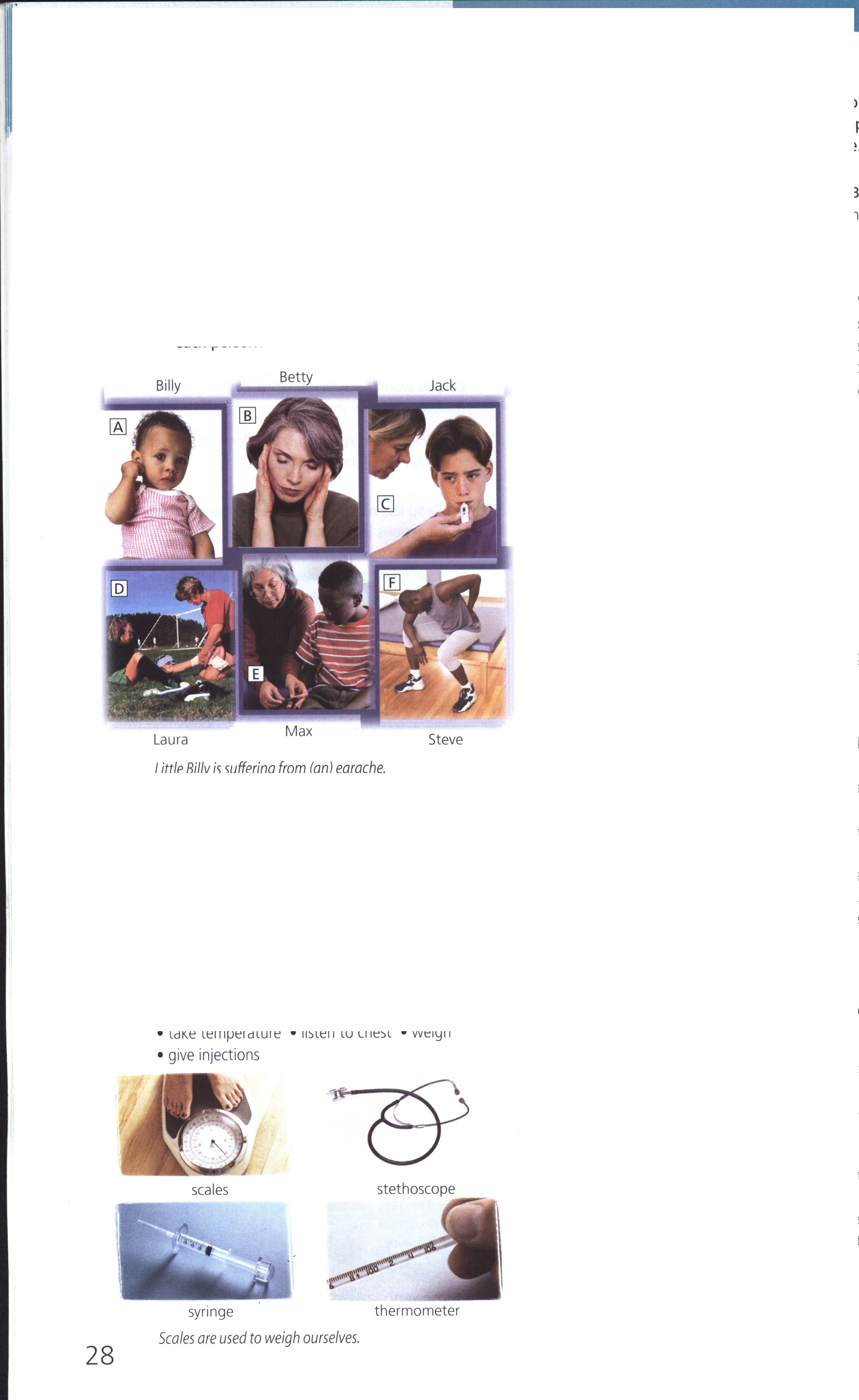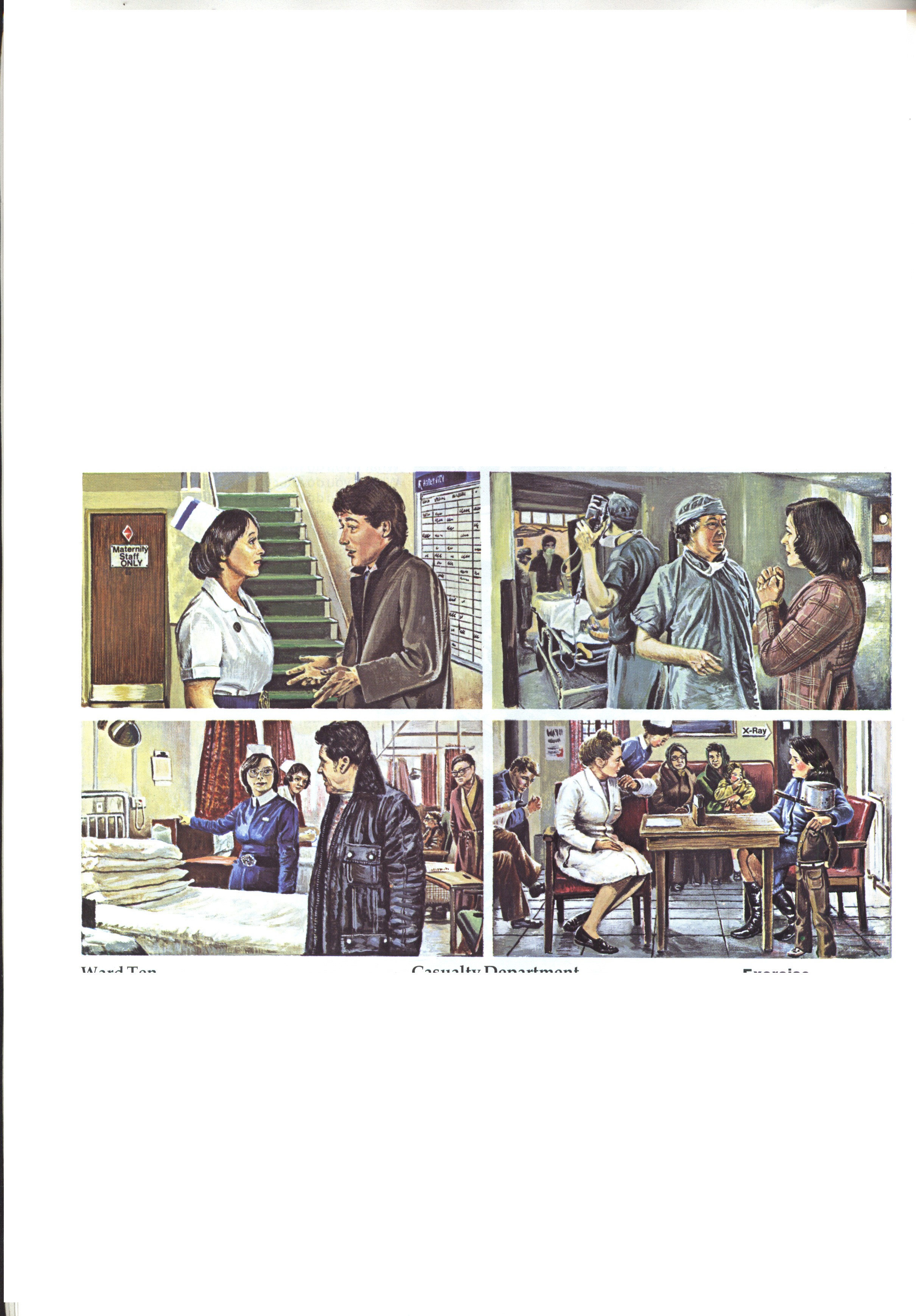
- •5 Read the text and answer the questions.
- •7 Look at the pictures and decide where each dialogue takes place. Justify your decision.
- •8 Listen to the dialogues and match each dialogue to the picture.
- •9 Look at the seven statements. You will hear four conversations at the hospital. Decide if you think each statement is correct or incorrect.
- •10 Who used these phrases? Mention the number of the conversation and the name of the speaker. (Nurse & Mr. Wallace, Doctor 1& Mrs. Foster, Sister& Mr. Frampton, Mother &Doctor 2).
- •11 Work in pairs. Act out similar conversations.
- •Vocabulary & grammar
- •12 Match the departments (1-6) with the ideas a-f below.
- •1 Casualty 4 intensive care
- •2 Children's ward 5 maternity ward
- •3 Operating theatre 6 outpatients' department
- •13 Match the people in a to the place you find them in b and the job they do in c. The first one has been done for you.
- •14 Read the two texts. Which one describes the working day of a surgeon? Which one describes the working day of a nurse? Complete the gaps with the words below each text.
- •15 Work with a partner. Look at the new words in the box. Tell your partner which of them you have experienced. Don't tell them any you don't want to talk about.
- •16 Label the items in the picture.
- •21 Read the text below and think of the word which best fits each space. Use only one word in each space. There is an example (0) at the beginning.
- •Modal verbs
- •22 Read the sentences and match the verbs/modals in bold to their meanings.
- •23 Complete the second sentence so that it means the same as the first. Use one of the verbs in the box below. The first one is done for you.
- •24 Complete the sentences using must, have to, may, might, could or can’t, as in the example.
- •25 Fill in the gaps with must, mustn't or needn’t/don’t have to, as in the example.
- •26 Fill in the gaps with needn't have or didn't have to and the correct form of the verb in brackets, as in the example.
- •27 Choose the correct sentence, as in the example.
- •28 Read the situations and write what you would say using should, ought
UNIT 3
IT REALLY WORKS!
LEAD – IN
1 Look at the pictures. What are the following used for? Use the prompts to make up sentences, as in the example.
● take temperature ● listen to chest ●weigh ● give injections

●scales ●stethoscope ●syringe ● thermometer
e.g. Scales are used to weigh ourselves.
2 Match pictures and specialists.
s urgeon
doctor dentist nurse
urgeon
doctor dentist nurse
|
|
|
|
3 The words below describe doctors who specialize in particular areas. What do they specialize in?
• Pediatrician
• Psychiatrist
• Neurologist
• Chiropodist
4 Match the verbs in A with the words in B, then decide which of the phrases are being described in five statements below.
1 You need a syringe to do this.
2 You need a scalpel to do this, and the patient usually has stitches and a scar afterwards.
3 You need to take this to the chemist's.
4 You need a thermometer to do this.
5 You need a stethoscope to do this.
A give take check feel write perform cure treat |
B a temperature an injection a prescription a diagnosis an illness an operation sick ill a disease the heart beat |
![]()
READING
5 Read the text and answer the questions.
A general practitioner or GP is also called a family doctor. He or she can treat most medical problems, but if the patient has a very serious condition, he/she will often refer the patient to a specialist. There are many kinds of medical specialists. For example, a pediatrician looks after children. A gynecologist specializes in women’s medical conditions. An obstetrician cares for pregnant women and delivers babies. A cardiologist deals with heart problems. If you have a serious problem with your skin, you can see a dermatologist. Surgeons perform operations. A psychiatrist looks after people with mental and emotional problems. Dentists look after teeth and optometrists check your eyes to see if you need glasses. If you have a serious eye problem, you may have to see an ophthalmologist. There are many more kinds of doctors who specialize in different areas of the body. Your GP can determine if it is necessary to see one of these.
If you want to see your doctor, it is necessary to phone and make an appointment. The nurse or receptionist will ask you what the problem is and may ask you to describe your symptoms before she gives you an appointment. If you have an appointment with a doctor and cannot make it, you must call and cancel. If you call the doctor’s office and it is closed, there will be an answering service to take your call. If your problem is serious, the doctor will call you back. If he/she is not available, another doctor will be “on call”. Nowadays, walk-in clinics are becoming very popular. You do not need an appointment to see a doctor in these clinics. Many people use these for minor problems, particularly at weekends or evenings when their regular doctor’s office is closed. If you have a very serious medical problem, you can go directly to the emergency department of your nearest hospital or call an ambulance.
1 What does a GP do?
A GP cures only mental problems.
B GP treats most medical problems.
C GP provides emergency aid.
D GP performs operations.
2 What can a GP do if his/her patient has a serious medical problem?
A Introduce the patient to the psychiatrist.
B Help the patient to find the operating theatre.
C Refer the patient to a specialist.
D Send the patient to the chemists.
3 When you phone to make a doctor’s appointment, what will the nurse or receptionist ask you?
A What is the problem?
B How old are you?
C Are you pregnant?
D Where do you live?
4 What will happen if you call the doctor and the office is closed?
A A nurse will provide emergency aid next day.
B The doctor will be ready to help you in a day.
C The paramedic will sent somebody to take your temperature.
D The doctor will call you back.
5 What is walk-in clinic?
A Clinics for mental problems patients.
B Clinics that are ready to solve your minor medical problems on weekdays.
C Clinics that specialize only in serious medical problems.
D Clinics where you must have an appointment to see a doctor.
6 Match the words on the left with the correct meaning on the right.
1 GP
GP
2 treat
3 pediatrician
4 obstetrician
5 psychiatrist
6 symptoms
7 receptionist
8 ambulance
9 optometrist
10 cardiologist
11 dermatologist
12 surgeon

A a person who checks your eyes
B a doctor who performs operations
C an emergency vehicle (car )
D a family doctor
E a heart specialist
F a person who answers the phone and greets people in an office
G give medical care
H a skin doctor
I a doctor who specializes in children
J a doctor who delivers babies
K condition of an illness
L a doctor who specializes in mental illnesses
LISTENING





